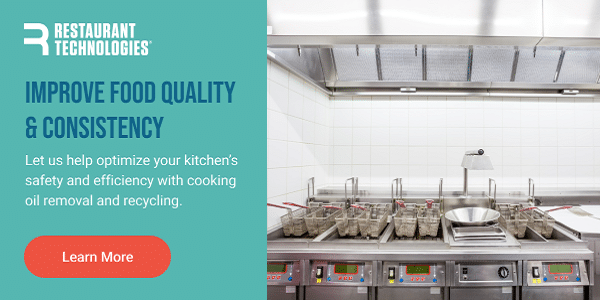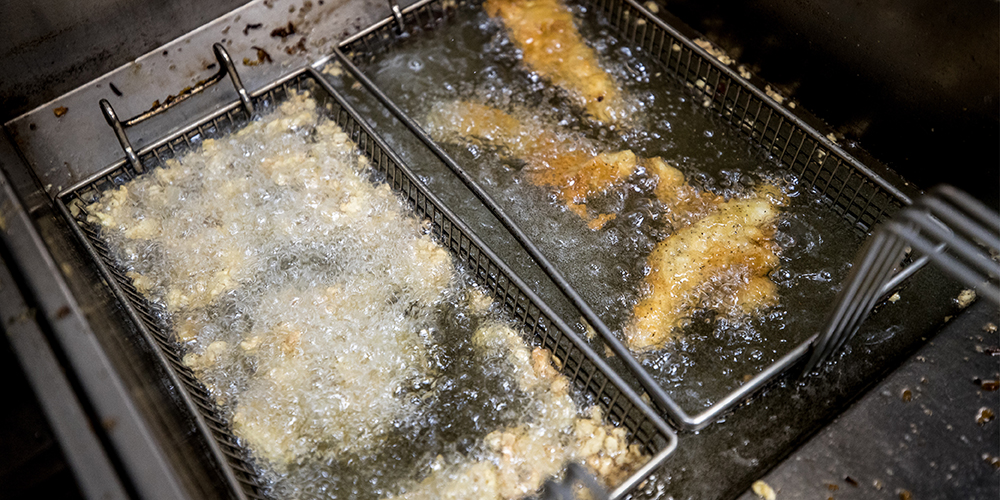Have you ever wondered why your cooking oil suddenly starts to foam when frying your favorite foods? Whether it’s bulk cooking oil for restaurant use or store-bought oil for your kitchen, oil foam commonly occurs in the world of culinary arts. In this article, we’ll delve into the science behind foaming in cooking oils and grease, explore common reasons for frying oil foaming, and provide practical solutions for preventing and managing foaming. Let Restaurant Technologies assist you in uncovering the mysteries of foaming oil.
Understanding Foaming in Cooking Oils and Grease
To comprehend why cooking oil foams, it’s essential to grasp the science behind it. Foaming occurs when moisture in food evaporates once dropped into the oil, a moistureless liquid. Evaporation leads to bubbles at the surface, which become foamy when mixed with other air-trapping food particles.1
Why Is My Oil Foaming?
Now that we understand the basics, let’s explore common reasons for frying oil foaming:
- High Temperature: Using excessively high temperatures while frying can cause oil to foam.2 When oil reaches its smoke point, it can start to break down and release steam, causing bubbles.
- Water Content in Foods: Moist ingredients, like frozen foods or items with high water content, can lead to oil foaming when added to hot oil. When water comes into contact with hot oil, it vaporizes, creating steam and air bubbles.3 Thawing and patting dry before frying can help reduce this effect.
- Impurities: Leftover food particles or contaminants in the oil that trap air can contribute to foaming and can make cooking oil go bad.1
Is Foaming Oil Bad?
Contrary to popular belief, foaming oil isn’t always a sign of trouble. In some cases, slight foaming can be normal, especially when frying foods with moisture content. However, excessive foaming can indicate issues like overheating, oil contamination, or the need for a change in oil.
Why Is My Grease Foaming?
Cooking grease, often used in deep fryers and commercial kitchens, can also foam. The causes of grease foaming are similar to those of cooking oil:
- Residual Water: If water remains in the deep fryer or on food items when they are added to hot grease, it can lead to foaming.
- Food Particles: Leftover food particles can cause grease foaming. Regularly clean the fryer to minimize this problem.
How to Stop Frying Oil and Grease From Foaming
Preventing foaming is a key component of managing cooking oil. Consider these solutions to achieve foam stability:
- Maintain the Right Temperature: Use a thermometer to prevent overheating and excessive foaming. Aim to keep the oil in your frying vessel below 375° F.1
- Dry Ingredients Thoroughly: Pat dry foods before adding them to hot oil to minimize moisture content.
- Maintain Cleanliness: Ensure your cooking equipment and oil are clean and free of contaminants. Regularly filter and clean your cooking oil to remove impurities and food particles.
- Avoid Overcrowding: Don’t overcrowd the fryer with too many items at once, as it can lead to excessive oil foam.
- Choose the Right Oil: Different oils have different smoke points and foaming tendencies. Select an oil appropriate for your cooking needs.
- Use Fresh Oil: Although making cooking oil last longer is cost-effective and less wasteful, fresher oil tends to foam less. Consider changing your oil regularly, especially in commercial settings.

Is Foaming Oil Harmful to Health?
Foaming oil isn’t inherently unhealthy. However, if foaming is a result of overheating, it can lead to the breakdown of oil components and can release unhealthy compounds such as trans fats.4 Additionally, consider the effects of certain oils such as soybean oil, and be cognizant of cooking oil allergies while using oil in the kitchen. In general, be mindful of cooking temperatures and oil quality to prevent any adverse health effects.
Simplify Your Cooking Oil Supply with Restaurant Technologies
At Restaurant Technologies, we understand that managing cooking oil in commercial kitchens goes beyond just preventing frying oil foaming and other common issues. That’s why we offer a comprehensive solution for cooking oi management, recycling, and delivery that ensures you have the right oil at the right time, hassle-free.
Say goodbye to the days of manually handling heavy oil containers and the inconvenience of running out of oil during busy shifts. Our automated oil delivery system takes care of it all. Here’s how it works:
- Precision Monitoring: Our Fryer Filtration Monitoring system not only helps maintain the quality of your cooking oil but also keeps track of your oil levels in real time. No more guesswork or last-minute orders.
- Scheduled Deliveries: Based on your kitchen’s needs and usage patterns, we schedule timely fresh cooking oil delivery directly to your establishment.
- Professional Installation: Our team ensures the seamless installation of the oil delivery system, so you can start benefiting right away.
Don’t let the complexities of managing cooking oil hold your kitchen back. Whether you’re running a small restaurant or a large commercial kitchen, Restaurant Technologies has the solution for you.
Understanding and Managing Foaming in Cooking Oils
Understanding why your oil or grease is foaming is the key to maintaining the quality of your culinary creations. By managing factors like temperature, moisture, and impurities, you can enjoy consistent results while deep frying. If you have any questions or need further information on cooking oil filtration and maintenance, don’t hesitate to contact Restaurant Technologies. Your path to flawless frying and delicious dishes is just a click away!
Sources:
- Deutsch, J. (2018, February 28). Why is my fryer oil foamy? Restaurant Business Magazine. Retrieved January 26, 2024, from https://www.restaurantbusinessonline.com/advice-guy/why-my-fryer-oil-foamy
- Esfarjani F, Khoshtinat K, Zargaraan A, Mohammadi-Nasrabadi F, Salmani Y, Saghafi Z, Hosseini H, Bahmaei M. Evaluating the rancidity and quality of discarded oils in fast food restaurants. Food Sci Nutr. 2019 Jun 6;7(7):2302-2311. doi: 10.1002/fsn3.1072. PMID: 31367358; PMCID: PMC6657716.
- P A Strizhak et al 2017 J. Phys.: Conf. Ser. 891 012017
- Song J, Park J, Jung J, Lee C, Gim SY, Ka H, Yi B, Kim MJ, Kim CI, Lee J. Analysis of Trans Fat in Edible Oils with Cooking Process. Toxicol Res. 2015 Sep;31(3):307-12. doi: 10.5487/TR.2015.31.3.307. PMID: 26483890; PMCID: PMC4609978







